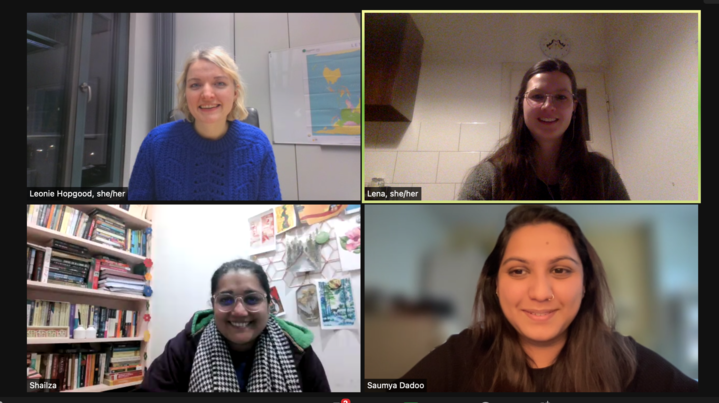February 7th 2022
As part of our Feminism(s) series in the program Gender and International Politics we came together with Saumya Dadoo and Shailza Sharma who are also the co-founders of the online platform Detention Solidarity to talk about feminism(s) in India. The aim of our teatime event has been to learn more about Indian feminism(s) and discuss ideas of feminism, feminist activism and challenges to women’s equality in modern-day India aiming at building and understanding of the Indian cultural context and strengthen knowledge about the state of gender equality in this diverse and heterogeneous subcontinent. To what extent has feminism been and still is a political force in the country? How does diversity and intersectionality have an influence on India’s feminist movement(s)? What issues and aims are broadly discussed within India’s feminism(s)?
Our speakers began to question whether there can be a clear-cut definition of an Indian women. Taking the disparity between for instance regional historicities, caste, education, and class into account, it has become intelligible that there is not one essential definition of an Indian women. Nevertheless, the notion and construction of women had been very much shaped by colonialism and the British colonial power. Introducing so-called Western gender binary and heteronormativity as well as ideas of society being based on gender segregation, a shift towards new concepts of gender and of women has be observable during colonial times. Moreover, new laws were passed that benefited foremost upper caste men as they had a legal impact that complicated the relations of power and gender.
Being crucially involved in nationalist and anti-colonial movements, like the movement led by Mahatma Gandhi, women were gaining influence. Hence, women gave rise to the Indian national congress and occupied an active role in political institutions and parties. Here, women were being seen as “mothers of the nation” that protected the family from the outside and from British influence. Gaining independence in 1947, our speakers concluded that the redefinition of Indian women in form of the new state of India can be observed. In this circumstance the Hindu Code Bill was passed in the 1950s including various laws that gave women more power, replaced religious laws and improved their overall positioning in society. However, especially upper caste men and elites were standing up against it as they were forming power right after independence.
In the following, many independent women’s organizations started to see drastic acts of violence against women like the burning of women as a counter-reaction to dowry debt. Especially the Muthura rape case from 1972 which describes the case of a 17 year old girl being raped by policemen was influential for Indian’s women’s movements-building. The related protests had led to legal changes and became site of feminist movements tension with the state. Gaining agency, sexual violence became a major concern of feminist movements and shifted the feminist point of view to personal law and hence to a politicization of the personal.
Another crucial impact was the liberalization and development of new markets in the post-1990s. Privatization and the extraction of resources and workforce as well as a neo-colonization related to neo-imperialism have given rise to new waves of protest and the globalization of the Indian’s movements.
Overall, the discussion illustrates that feminist historical work lay the foundation for today’s women’s movements. Moreover, it has become clear that today’s women’s movement is driven by among other things a rights-based perspective while being confronted with diverse subjects including sexual gender-based violence, LGBTIQ+, protests surrounding citizenship, the dichotomy of urban and rural areas, land-grabbing and religious segregation. Moreover, the movement(s) is currently faced with pressing issues concerning the Hinduist nationalist government and related shrinkage of civil society’s and movement’s spaces.
This event was organized by Polis180’s programs Gender and International Politics. It is part of the event series Feminism(s) that takes a look at feminist movements, ideas, and actors around the world.
Text by Leonie Hopgood & Lena Wittenfeld
Zurück